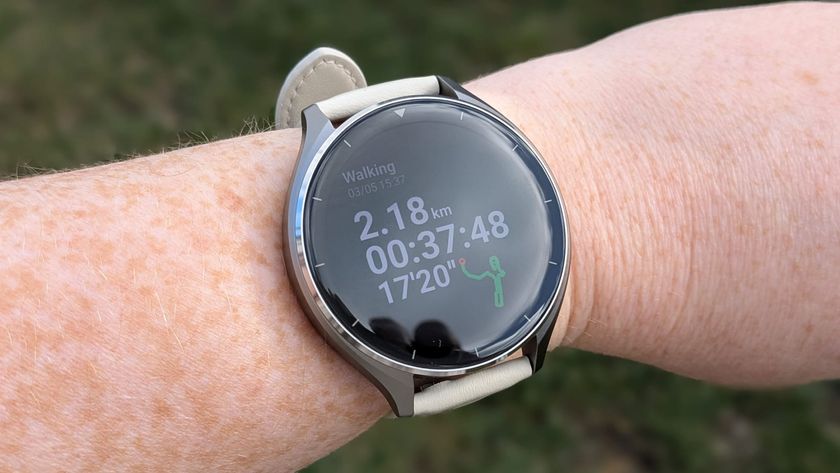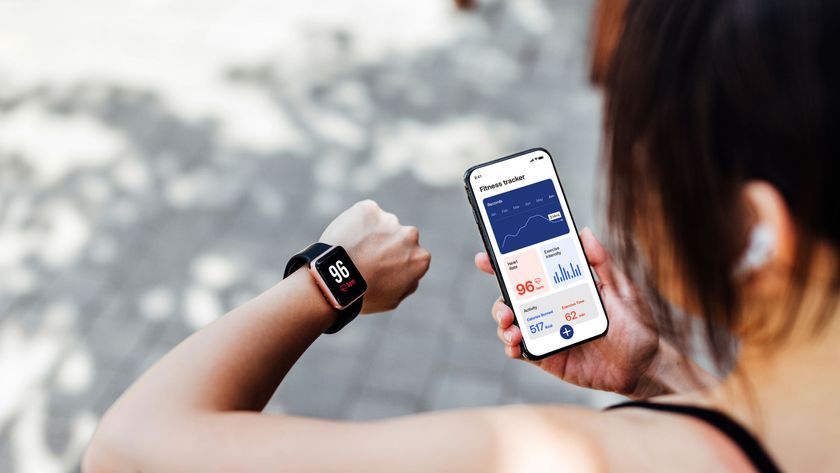Best running watches 2025: Our top picks for every runner
We have tested some of the best running watches on the market — whether you are looking for something on a budget or a premium GPS smartwatch, we have a fitness tracker for you.

Having one of the best running watches as a companion during your run can make a huge difference to your performance. Offering loads of data and in-depth insights into your running routine, these wearables can keep you on track during your daily runs. Whether it is the pricey Garmin Enduro 2 or the iconic all-rounder Apple Watch Series 8, they have everything you may need to hit your PBs. But how do you know which running watch will suit your needs? This is where we come in.
With so many running watches to choose from, choosing the one for your needs can be a mammoth task. That's why we've put together this guide — our expert reviewers have tried and tested some of the best fitness trackers for runners, giving you all the information you need to make the right decision for you. We have considered their design, battery life, tracking accuracy and ease of use as well as smart features, connectivity and price. You can read more about our testing protocol in the How we test section down below.
Our Running Watches FAQs section can help you if you're new to running and unsure what to look for. And if you're looking for something more affordable, our guide to the best budget fitness trackers might be useful.
The quick list
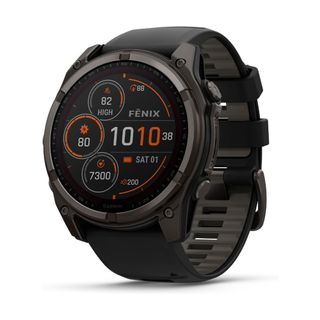
Best overall
The premium Fenix 8, with its pin-sharp OLED screen, superb battery life and wealth of features, is the jewel in the Garmin crown. A real treat for every runner — but pricey.
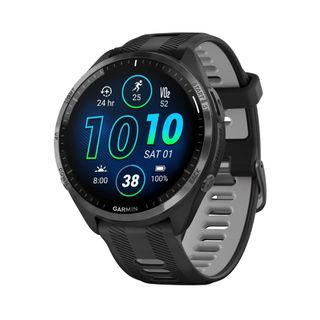
Best under $600
This beautifully designed wearable delivers excellent tracking performance at a reasonable price, making it one of the best mid-range running watches.

Best on a budget
The Coros Pace 2 is sleek, lightweight and packed with features, all without compromising on battery life or tracking accuracy — and it costs only $199.

Best for beginners
Looking for a quality entry-level watch that does not cost the earth? The thoughtfully designed and feature-packed Forerunner 265 is your best shot.

Best all-rounder
With its superb tracking performance and countless apps, the flagship Apple smartwatch has everything you may need for your life outside of the running track.

Best for ultra-marathons
With exceptional battery life, durable build and top-notch performance, this sleek running watch is a great option for ultra-long distance runners.
The best running watches we recommend in 2025: Fully tested by our in-house running experts
Why you can trust Live Science
The best running watch overall







Specifications
Reasons to buy
Reasons to avoid
✅ You want deep dive health and fitness stats: The Fenix 8 is a true rival to the wealth of stats offered by the Apple Watch Ultra
✅ You spend time in the water: It has 10ATM water resistance and is also dive-proof up to 40 metres
✅ You want a true smart watch: As well as fitness features, you can take calls, send messages and use its digital assistant
❌ Your budget is tight: This watch comes at a super premium price
❌ You aren't planning to use all its features: If you don't swim or dive and don't use all the stats, there are cheaper options available in the Garmin line up.
🔎 Garmin Fenix 8: If you want a deep dive into your fitness analytics, and are partial to a dive in the ocean too, then the new Garmin has it all. With new swim features, smart watch capabilities and superior tracking metrics, it's a superb watch — but it does come with a hefty price tag.
A new watch in the premium Garmin Fenix line-up is always noteworthy, and the new Fenix 8 is no exception. On the face of it, it doesn't look too dissimilar from its predecessor, the Fenix 7. However, there are quite a few upgrades and changes, including a pin-sharp OLED screen and a big upgrade in terms of its functionality under water. Whether or not these upgrades are worth the significantly increased price tag may be a question for your budget. What is not in question, however, is that this is a truly impressive top-end smartwatch for runners.
While OLED screens used to mean shorter battery life, the Fenix 8 can boast an impressive 16 days between charges, though as with all watches, this drops quicker the more you use GPS.
The Fenix 8 has Garmin's latest six LED optical heart rate sensor, which our reviewer found excellent when tracking running and cycling as well as for monitoring resting heart rate. For those who love to spend time in the ocean, the Fenix 8 now is not only waterproof to 10ATM but also dive-proof to 40m.
Our Garmin Fenix 8 reviewer was impressed by the stability of heart rate monitoring overall, though it did sometimes struggle with very short intervals during gym work. The dual-band GPS also sometimes took a little longer than expected to locate, however our reviewer also noted that this may be a software issue which will be fixed with an update.
The Garmin maps available on the watch (which remain free to download) are a hugely impressive feature for those who love outdoor adventures.
New 'true' smartwatch features include a speaker and a microphone to take calls, a digital assistant to whom you can delegate basic tasks, including starting timers.
The only real drawback of the Garmin Fenix 8 is the steep price. Those looking for premium product at a slightly less eye watering price should check out the still-brilliant Garmin Fenix 7 which may now be available with discounts, while runners will likely find that the excellent Forerunner 965 has all the features they need.
- Read our full Garmin Fenix 8 review
Best running watch under $600






Specifications
Reasons to buy
Reasons to avoid
✅ You want advanced workout tracking features: Great for data-driven runners and semi-professional athletes.
✅ You run outdoors: It comes with on-watch maps and reliable GPS navigation.
❌ You are on a budget: It can cost as much as $700.
❌ You run in extreme outdoor conditions: It is not as durable as some of the more premium Garmin watches.
🔎 Garmin Forerunner 965: Packed with features, advanced tracking which is both accurate and reliable and with a classic Garmin Forerunner design, this is the perfect Garmin for serious runners. It's not the cheapest, however, and for the price you might expect less plastic and more metal.
If the Garmin Fenix 8 is (understandably) a little too pricey, the Forerunner 965 is an excellent alternative. You lose the metal back (the Forerunner 965 is mostly plastic), some water resistance and other features, but it is still a great running watch and arguably even better for newer runners.
The Garmin Forerunner 965 combines our favorite bits of traditional best Garmin watches, with the gloss of more smartwatch-style tech. It is a good combo. Our take on the design is that, despite the shift to a fancy bezel, this is pretty much classic Forerunner watch design. It is less rugged-feeling than either the Epix 2 or Fenix 7, with less of a built-up screen surround.
It also lacks a couple of the most shiny, smartwatch-like bits of the Garmin Venu 2 Plus. There is no support for Alexa here, or a built-in speaker beyond a little beeper. We do not miss either, although some might like the idea of a Garmin announcing their performance at each kilometer of a run, through a built-in speaker, as some Huawei and Amazfit watches do.
Still, it is well worth the investment — and we can vouch for it. During our Garmin Forerunner 965 review, we were impressed with the accuracy of its measurements and the sheer range of its available features.
- Read our full Garmin Forerunner 965 review
Runner-up
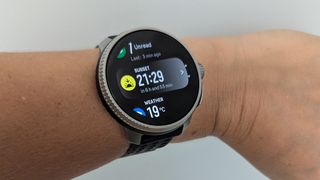
Best under $600: Runner-up
There is a lot to like about Suunto Race, from excellent health tracking features and accurate GPS to long battery life, and it is cheaper than the Forerunner 965 by around $150. However, it also has a big, chunky design and underwhelming display.
For
- - Long battery life
- - Detailed maps
- - Accurate health tracking
Against
- - Chunky design
- - Not intuitive to use
- - Underwhelming display
Best budget running watch




Specifications
Reasons to buy
Reasons to avoid
✅ You are a beginner: No extensive stats or confusing features.
✅ You want good battery life: It can last up to 20 days on a single charge.
❌ You want a touchscreen: It is controlled with buttons.
❌ You want advanced features: Not as versatile as Garmin watches.
🔎 Coros Pace 2: With accuracy, a simple lightweight design and a superior battery life, the Coros Pace 2 is an excellent running watch for those on a budget, whether you are a beginner or are an experienced runner. It may lack the deep dive analytics of top end Garmins, but you get more than your money's worth.
The Coros Pace 2 is a great running watch that focuses on a core set of features that will not trouble the most expensive players, but certainly offers plenty to consider.
For one, it is relatively affordable — it costs around $199. Secondly, the Coros Pace 2 offers 20 days of battery life, blowing the Apple Watch right out of the water. It still has a built-in GPS, which lasts up to 30 hours (making it suitable for marathon or ultra marathon runners) and it is lightweight too, with a comfortable nylon strap.
During our Coros Pace 2 review, we tested it alongside the Apple Watch Ultra we use daily, and found its heart rate and fitness data (including the likes of step count and calories burned) to be in line. That is impressive given it costs around a quarter of the price of Apple's premium watch.
Sadly, you can’t play audio directly from the device and information from the Coros app does not sync with health apps on Apple or Google. Still, it is a good-looking device, that's a great budget option for beginners.
- Read our full Coros Pace 2 review
Best running watch for beginners





Specifications
Reasons to buy
Reasons to avoid
✅ You want a multisport watch: It tracks more than 100 activities.
✅ You are looking for a reliable mid-range running watch: It offers great performance at a reasonable price.
❌ You run in challenging outdoor conditions: It may not be as durable as some of the more premium Garmin watches.
❌ You want downloadable maps: It will not store the data.
🔎 Garmin Forerunner 265: With a lovely OLED screen, tracking in over 100 activities and excellent (and accurate) tracking metrics, the Forerunner 265 is the perfect mid-range running watch. However it is rather more plasticky in feel than the top of the range Garmins.
The Forerunner 265 is a Forerunner 255 with OLED. It is a Garmin Epix alternative that puts much less of a dent in your savings. Or it is a Garmin Venu 2 that trades in a little design gloss for some more advanced fitness features. We think it is a killer combo. If you are looking for your first-ever running watch, the Garmin Forerunner 265 has all the high-end features you may need without the unnecessary frills that inflate the price.
The model we tested in our Garmin Forerunner 265 was the smaller Forerunner 265S, but there were none of the usual battery life compromises common to smaller watches here — official figures suggest it actually lasts slightly longer than the larger Forerunner 265, making it one of the best fitness trackers on the market.
The screen is the main event here. It is a 1.1-inch 360 x 360 pixel OLED, or a 1.3-inch 416 x 416 pixel one in the Forerunner 265. While it does not fill out the front of the watch like the Apple Watch Series 8’s display, this little screen has everything we are looking for.
It is very sharp, super-colorful, and easily bright enough to work for outdoor exercise sessions on sunny days. This screen’s job is to make an argument for itself over the Forerunner 255’s transflective screen, and it is pretty persuasive, particularly when it is a touch display too. The Forerunner 255’s is not.
- Read our full Garmin Forerunner 265 review
Best all-rounder running watch





Specifications
Reasons to buy
Reasons to avoid
✅ You want comprehensive health tracking features: It tracks a range of stats, including your menstrual cycle.
✅ You need a great all-rounder: It comes with plenty of apps and handy features.
❌ You want good battery life: This watch lasts around one day on a single charge.
❌ You do not have an iPhone: It is not compatible with Android devices.
🔎 Apple Watch Series 8: Apple lovers will certainly love the huge array of metrics and apps that only Apple can deliver. The Apple Watch also has reliable GPS and heart rate tracking, in addition to a whole new series of metrics like menstrual cycle tracking. But it does come with a steep price tag, and the battery life isn't the best.
The Apple Watch Series 8 is not only a great all-rounder for iPhone users, but also a reliable running watch — as long as you do not plan to run multi-day ultra marathons.
The Apple Watch Series 8 is not a huge upgrade on the Series 7, with temperature sensors to help with fertility tracking and crash detection functionality the only truly new features. Still, that is not necessarily a bad thing since the product line is far beyond the capabilities of its competitors.
With its own version of the App Store with hundreds of Apple Watch apps, and the option to use third-party running options like Strava, it is also got a large, bright display and an endless variety of strap options. During our Apple Watch Series 8 review, we were also impressed by its reliable GPS and accurate heart rate monitoring — and these two features can make or break a running watch.
However, the biggest issue is its battery life. While Apple has added a new low-power mode, you will tend to get between two and three days if you are not using it often or switch the “always-on” display off. That is some way short of the competitors on this list.
- Read our full Apple Watch Series 8 review
Best running watch for ultra-marathons




Specifications
Reasons to buy
Reasons to avoid
✅ You want to use it for swimming, too: It features 10ATM water resistance.
✅ You want a reliable outdoor watch: It offers accurate GPS and on-watch maps.
❌ You are on a budget: The Enduro 2 can cost as much as $999.
❌ You want something small and discreet: This watch is on the chunky side.
🔎 Garmin Enduro 2: A watch for the hard core adventurer or ultra marathoner, the Enduro 2 is impressive but extremely expensive. The battery life is extraordinary, at over a month, so it's certainly good for epic adventures — but probably overkill for most amateur runners.
The Garmin Enduro 2 is not for newcomers to running and is squarely focused on the most hardcore cardio enthusiasts, with a price tag that starts at $1,099 – twice that of the Apple Watch Series 8.
For one, it can last for longer than a month, and more than 40 days with solar charging. Despite its slate of features, it is surprisingly compact and comfortable on the wrist – although those with smaller wrists may want to look elsewhere. During our Garmin Enduro 2 review, we were also impressed by its GPS tracking, reliable heart rate monitoring and detailed sleep tracking (it can, however, fail to detect wakeful moments at times).
It offers both buttons and a touchscreen, excellent map support, and a “super bright” LED torch to help signal or keep an eye on what’s in front of you. If you are new to running, it is not for you, but if you are preparing for an ultra-marathon or something just as challenging, you will find a lot to love.
- Read our full Garmin Enduro 2 review
Best Garmin Alternative running watch




Specifications
Reasons to buy
Reasons to avoid
✅ You want a Garmin alternative: Offering military-grade durability, the Ticwatch Atlas easily competes with Garmin watches and at a reasonable price.
✅ You want an adventure watch: Tested against harsh environmental conditions, this watch is perfect for adventure or trail runners.
❌ You use iOS: The Ticwatch Atlas is only compatible with Android.
❌ You want a clear screen at all times: The screen attracts dirt and marks easily which might be an issue for trail runners.
🔎 Ticwatch Atlas: Built for adventures, this watch can accompany you just about anywhere with its military-grade durability. With outstanding battery life in ultra-low mode, and not too bad a battery life in normal mode, we loved the Ticwatch Atlas and felt it competed well against Garmin watches and at a steal of price.
The Ticwatch Atlas is a solid and dependable watch for runners, competing with some of the best Garmin watches. We found the health stats to be largely accurate while the watch itself was comfortable to wear, day and night.
With a price tag of only $349, we couldn't quite believe what we got for the money. The battery life is around 90 hours in normal mode but the ultra-low mode sees the battery life extend to a whopping 45 days — this is not something we often see.
Controlled by both a crown and button, plus the touchscreen, we found the navigation took a few days to get used to. However, we particularly liked the multi-controls as this came in useful during cardio workouts and meant our reviewer didn't need to fiddle with the watch for too long. We think this is a bonus when out running.
- Read our full Ticwatch Atlas review
Best running watches: Comparison
Model | Rating | ✅ Pros | ❌ Cons |
|---|---|---|---|
Garmin Fenix 7 | ★★★★½ | Excellent tracking performance, precise GPS, durable, long battery life. | Bulky and relatively expensive. |
Garmin Forerunner 965 | ★★★★½ | Excellent tracking performance, precise GPS, long battery life, reasonably priced. | Plastic build. |
Coros Pace 2 | ★★★★½ | Great tracking performance, lightweight, precise GPS, relatively affordable. | No touchscreen, fewer features. |
Garmin Forerunner 265 | ★★★★½ | Great tracking performance, comfortable to wear, crisp display. | Plastic build, no on-watch maps. |
Apple Watch Series 8 | ★★★★½ | Excellent all-rounder, great tracking performance, plenty of features. | One day battery life, lacks some durability. |
Garmin Enduro 2 | ★★★★ | Excellent tracking performance, precise GPS, durable, long battery life. | Relatively expensive, chunky design. |
Ticwatch Atlas | ★★★★½ | Accurate tracking features, great battery life, durable and comfortable. | Screen easily marks, only compatible with Android, no coaching features. |
Our expert consultants

James Rodgers is a running coach and marathon runner with over 20 years of racing experience and a 10K PB at an impressive 31.13 minutes. Certified by the United Endurance Sports Coaching Academy, he helps his clients step up their running performance. James told Live Science about the benefits and accuracy of running watches. He also commented on his favorite models.

Kieran Alger is a fitness editor and writer on all things tech, running, health & fitness. He is an ultramarathon and marathon runner and cofounder of The Run Testers, who review the best and latest running products after putting them to the test in the field. We spoke to him about how to choose the best running watch.
Best running watches: Frequently Asked Questions
How accurate are running watches?
Running watches can provide highly accurate navigation, helping you to plan, execute and review your runs. Many models use Global Positioning System (GPS) satellites to track your movement, giving you reliable measurements of pace and distance, Rodgers said. “However, the GPS can be less effective in large city races with thousands of runners and large buildings," he noted.
One area that many running watches need to improve is the built-in wrist sensor for heart rate, Rodgers said. These sensors tend to provide less accurate measurements during runs than when the user is sleeping or resting, according to a 2020 review published in the Journal of Sports Science. "If you like to use precise heart rate data in training, I recommend using a chest strap instead," he said.
Are running apps worth it?
Running apps — such as Strava, Runkeeper or Nike Run Club — can be useful tools for tracking your training and providing motivation. "For example, if you didn't feel strong in the last half of your 10k, you could review your training with a coach to see what improvements could be made," Rodgers said.
Some running apps can also introduce a significant social component to your training. For example, Strava allows you to comment on others' runs and see the training activities of the runners you follow. “These can be anyone from fellow club members to professional marathon runners," Rodgers said.
Moreover, running apps and widgets that provide real-time feedback on the intensity and duration of the run may help users exercise at an appropriate level, potentially reducing their risk of injuries in the long term, according to a 2020 review published in the Journal of Sports Sciences.
What is the best running watch?
The Garmin Fenix 7 won us with its excellent performance, bright display and long battery life, which is why this premium running watch takes the top spot in this guide. However, Rogers prefers a different model. "I really like the Garmin Forerunner 965," he said. "There is a huge variety of tracking metrics, including heart rate variability and sleep tracking, and various scores based on your performance when using the watch, such as Endurance and Hill scores," Rogers said. He also liked the looks and long battery life of the Forerunner 965, and that it can use supplementary features, such as Garmin Pay.
What is the best budget running watch?
We think the Coros Pace 2 is the best budget running watch on the market — and Rodgers agrees. "I love it," he told Live Science. "The Coros Pace 2 is an affordable running watch that has all the key features that I like to track and does the critical things well. It has extremely long battery life, its accuracy is excellent and it is extremely quick to connect to satellites," Rodgers said. He also liked the Coros Pace 2 for its intuitive features, swift charging pace and lightweight design.
How to choose the best running watch for you
The best running watches for some may not be the same for others, and there are a few things to consider when purchasing one.
Firstly, if you’re new to the hobby, you’re going to want to consider your budget. There are all-singing, all-dancing options that break the $1000 mark, but that doesn’t mean you should go all in. Naturally, if you’re a keen runner and want to get all of the features on offer, you may find a reason to go a little bigger.
Secondly, not all running watches are built equally, and while you’ll no doubt find an array of basic features across all of them (step and calorie tracking and heart rate monitoring), some add more data or more features than others. For example, if you’re planning to run a marathon, you may want something that offers a longer battery life, as well as built-in coaching to help you reach your distance or pace goal.
As Kieran Alger, an ultramarathon runner, told Live Science: "A good running watch not only lets you know how far, or how fast, you've been running, but it gives you a whole range of insights that you can use — along with your awareness of your body — to guide your training and monitor your fitness progress."
You may also want a watch that writes its data to third-party apps, like popular running app Strava, or that features a built-in GPS so you can leave your phone at home. Many even offer storage so you store music to play when you’re out and about.
If possible, it’s always helpful to try on a watch, too. Some are larger than others or come in multiple sizes, and users with smaller wrists may want to check strap sizes. This can often affect the display size, so be sure to pick one that’s easily readable in all conditions.
Finally, there are some watches that only work on Android or iOS, so your choice of phone could have a big bearing on the best running watch you can pick up.
How we tested these running watches
How we test the best running watches
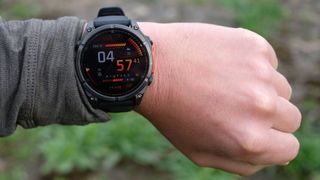
Our in-house reviewers are experienced exercise professionals and keen runners who understand the value of reliable workout tracking. At Live Science, we have tested dozens of wearables over the years, from compact fitness bands for the budget-conscious to high-end rugged smartwatches designed with professional marathon runners in mind. We know which models are worth the hype (and often a hefty investment) and which tend to have little impact (or none at all) on your daily runs. We only choose to wear the best wearables, after all.
We pride ourselves on being as objective and meticulous as possible in our reviews, which is why we test all running watches using the same protocol. We spend at least a week with each device, then rank it across the following categories:
1) Design. We take note of the dimensions, weight, durability and customizability of the wearable in question. We assess its appearance and overall functionality, so we know who the intended audience is (beginners? average exercisers? running pros?), and check whether it is comfortable to wear and easy to use during intense workouts. We also report any scuffs and scratches that the wearable sustained during testing.
2) Display. This is where we take a deep dive into the screen specs heart — the heart of every running watch. We check the size, durability and design of the screen, assessing how bright, colorful and easy to read it is in various conditions (for example, in direct sunlight or low visibility). We also make note of the touchscreen's responsiveness and point out any lags or performance issues we experienced when running.
3) Features. We assess the functionality of the running watch in question. For example, how many running stats does it measure, and how in-depth are they? Does it offer sport-specific feedback or coaching? Can it connect to Strava and other third-party apps? Can it store music or show you the maps of your trails? Also, can it be used as an everyday smartwatch?
4) Performance. We put the running watch through its paces to get a good understanding of its battery life, tracking performance and connectivity. We wear it during the day, while sleeping, and when doing various running workouts, regularly switching between different battery modes and running-specific settings. Lastly, we thoroughly assess the accuracy of its heart rate tracking sensor using a chest-strap heart rate monitor (such as the Polar H9), and (if applicable) check whether its GPS readings are precise and fast to triangulate.
Verdict. Finally, we give our verdict on the key questions: is this running watch worth it? Who would benefit from it the most? Who may want to avoid it? After testing, we grant a final score out of five, and decide whether the wearable in question has what it takes to land in this roundup.
Latest updates
February 12, 2025: We expanded the How we test section and reworded some descriptions for clarity.
Sign up for the Live Science daily newsletter now
Get the world’s most fascinating discoveries delivered straight to your inbox.
Lloyd Coombes freelance tech and fitness writer for Live Science. He's an expert in all things Apple as well as in computer and gaming tech, with previous works published on TechRadar, Tom's Guide, Live Science and more. You'll find him regularly testing the latest MacBook or iPhone, but he spends most of his time writing about video games as Gaming Editor for the Daily Star. He also covers board games and virtual reality, just to round out the nerdy pursuits.
- Anna GoraHealth Writer
- Kate Carter
